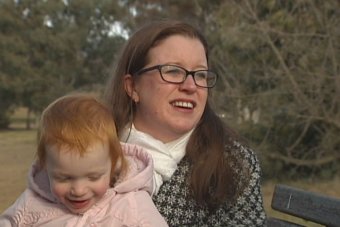The Federal Government has refused to extend a funding agreement with the states and territories to provide care for women with perinatal depression.
Under the agreement, reached in 2008, thousands of new parents accessed screening and counselling services aimed at identifying and treating the illness in the early stages.
The $85 million program, known as the National Perinatal Depression Initiative (NPDI), expired in 2013 and health ministers have been negotiating its future ever since.
This week, however, Federal Health Minister Susan Ley informed her counterparts across the country the Commonwealth would stop contributing money by the end of the month.
Victoria’s Minister for Mental Health, Martin Foley, criticised the decision at a press conference in Melbourne on Friday.
“To cut the programs that fund perinatal programs that support mothers and children is just one of the cruellest cuts [the Federal Government] could deliver to the most vulnerable families,” he said.
Queensland Health Minister Cameron Dick said the announcement came as a surprise.
“We received a letter on June 15 telling us that $1.6 million will be taken out of this program from Queensland from June 30,” he told 7.30.
“That’s no way to run federal-state relations and it’s no way to run a national response to a very serious issue.”
Suicide linked to mental health problems is the leading cause of maternal deaths.
Researchers at Melbourne’s Centre of Perinatal Excellence (COPE) argue the NPDI was helping mothers detect early signs of trouble.
“We know that the faster someone is identified and treated, the faster they seek help, and the faster they recover,” COPE founder Dr Nicole Highet said.
“That stops the long-term impacts not only for the mother but also the family and the baby.”
Cost of not screening greater than cost of NPDI: report
An economic analysis released by COPE last year found the cost of not screening mothers in the perinatal period was far greater than the $85 million governments had invested in the NPDI.
“We know that by not identifying or treating, for example, post or antenatal depression in 2013, that would cost the economy around $530 million,” Dr Highet said.
Ms Ley was travelling through her remote electorate and was not available for interview.
I was frightened. I just couldn’t do the job. I didn’t think I was up to the challenge.
Jill Brown, mother
In a statement, Ms Ley said the Commonwealth’s contribution to the NPDI was only intended to be used for ‘training, up-skilling and service improvement’, not frontline services.
“The states and territories were funding frontline services prior to the National Partnership Agreement and it remained their responsibility,” the statement said.
“The Abbott Government currently invests over $5 million in frontline perinatal services and there has been no change to this.
“As the previous government introduced the agreement with no evaluation of its success, we will now conduct an evaluation of the program to determine the most effective way the Government can assist those with perinatal depression.”
Mr Dick said state and territory governments would be hard-pressed to make up the shortfall in funding.
“If we can do something, we will,” he told 7.30.
“But there is only so much that state governments can do to fill these gaps that are constantly being created by the failure of the Abbott Government to properly fund public health services across Australia.”
Mother with post-natal depression ‘felt like running away’
Canberra mother of two, Jill Brown, 38, was excited to become a mother but after the birth of each of her two children, she was crippled by anxiety and depression.
“I was frightened. I just couldn’t do the job. I didn’t think I was up to the challenge,” she said.
“That was really saddening for me because, as a woman, I think you feel like you should just naturally know what to do.
“You see TV adverts that show everyone looking so delighted at being a parent and it’s really hard to accept that’s not the reality for you.”
It was not until she began dreaming of leaving her family that Jill Brown sought help from a psychiatrist.
“I felt like running away. I felt like leaving. I packed suitcases and was half way out the door before my husband discovered me,” she said.
Counsellors at a national helpline run by the Post and Antenatal Depression Association (PANDA) are flooded with calls from anxious parents like Jill Brown every day.
“They’re working in a very intensive and ongoing way with families who are experiencing perinatal depression or anxiety,” she told 7.30.
“Many parents are facing a mental illness for the first time in their lives at a time when other families are experiencing joy and delight at the idea of a new baby.”
Terri Smith said she was devastated to learn the Federal Government had withdrawn its share of the funding for the NPDI.
“For us, it’s a tragedy and an injustice. It’s such an important program, targeting high-need families,” she said.
“It’s not just about caring for those adults — the mum and dad or whoever is unwell at the time — What’s so crucial about the money is that it’s also giving that new baby the best possible start at life.”

